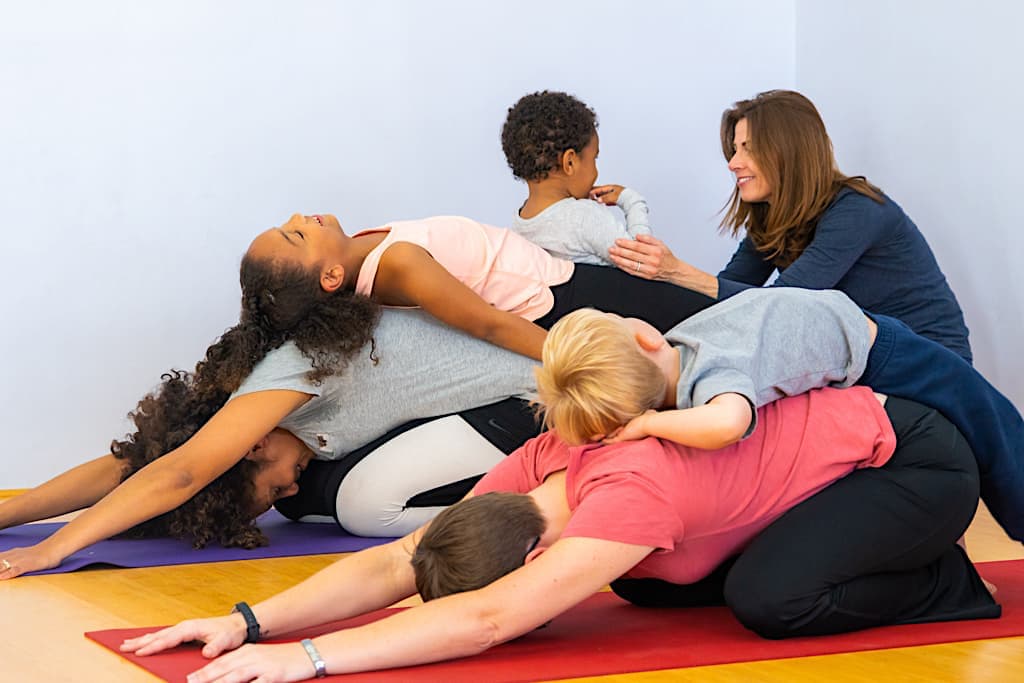Our services include Yoga, meditation and mindfulness. Our process is what makes It’s Yoga Kids® unique.
|
THE PRACTICE |
PAUSE & POSITION |
PERCEIVE & PONDER |
|
Yoga |
Anatomy & Alignment |
Observe (I notice…) |
|
Meditation |
Focus & Concentration |
Curiosity (I wonder…) |
|
Mindfulness |
Awareness & Memory |
Overcome Challenges |
Our results include typical benefits of Yoga including strength, flexibility, focus and balance, and much more, both on and off the mat.
|
|
BODY |
MIND |
HEART |
|
STRENGTH |
Strong Bones and Muscles |
Focused Determined Disciplined |
Passionate Leader/Upstanding Clear Communicator |
|
FLEXIBILITY |
Realizes Full Range of Motion |
Adaptable Resilient Open-minded |
Aware Empathetic Helpful |
|
BALANCED |
Understands Personal Edges |
Confident Positive Attitude Responsible |
Connected Independent Peaceful |
Look for a high quality family and kids’ yoga class near you. Make sure the instructor is Certified to teach Yoga to children. There are important safety differences in working with a growing body compared to an adult body in addition to the nuances and teaching cues that are most successful at every age.
It’s Yoga Kids® teaches Self-Management Life Skills including: Self-Care, Self-Motivation and Self-Regulation. These skills are essential to meet today’s challenges.
1. Self-Care with Movement
- Strength
- Flexibility
- Balance
→ Body Control – safe and appropriate physical actions
2. Self-Motivation with Meditation
- Stillness
- Focus
- Discipline
→ Mental Control – manage thoughts based on goals
3. Self-Regulation with Mindfulness
- Awareness
- Critical thinking
- Decision-making
→ Impulse Control – stop and think – imagined consequences
Integrating yoga into your child’s life early helps to ensure their individual success and with increased awareness translate to the greater good globally.
According to Katherine Lewis, author of the new book The Good News About Bad Behavior, we are in a crisis of self-regulation among kids today. This, she explains, is the reason why nearly half (50%) of today's children will develop a mood disorder, behavioral disorder or substance abuse problem by age 18.
“The rise of social media and web culture, which has us "always looking outside ourselves," along with the decline of community and unstructured play time. Today's children tend to roam the world as independent contractors, and are taught to focus more on individual achievement rather than their contributions to family, neighborhoods and friends.”
We believe Yoga can bridge that gap. With the trend of individual achievement, kids can learn how to contribute their gifts to their local communities and in turn, create positive global impact.
Anxiety is the most common mental-health disorder in the United States, affecting nearly one-third of both adolescents and adults, according to the National Institute of Mental Health. Growing up is stressful. How do we help kids manage the demands of our time? Yoga teaches these three practices:
- Move Your Body: Awareness
- What’s going on inside of me
- What’s going out around me
Movement releases tension in the body. Meditation and mindfulness bring awareness and allows kids to reflect and manage their changing bodies and brains. Ultimately, these habits of body and mind as well as those for healthier habits at home can inform their choices in life helping them to act with kindness – the ultimate social capital.
- Reset Your Mindset: Attitude & Approach
- Reframing stress to tension
- Negative to positive
Research in brain and behavior science instead reveals that it is the compounding impact of our habits and self-narratives that really matter. But how do we set the foundation for those habits and stories? Where do they begin? What is it that sets our course and fuels us forward?
- Balancing Effort and Ease: Action
- Finding flow for kids
- Exploring purpose
Developmental psychologist and Director of the Stanford Center on Adolescence Dr. William Damon addresses this need to cultivate motivation and aim in his book, The Path to Purpose: How Young People Find Their Calling in Life. Dr. Damon believes that a clear sense of purpose inspires young people and gives them direction. He makes the case that high standards alone are not enough to support success. In his words:
“Purpose is a stable and generalized intention to accomplish something that is at the same time meaningful to the self and consequential for the world beyond self. Purpose endows a person with joy in good times and resilience in hard times, and this holds true all throughout life.”
True purpose, he says, has to be of consequence beyond the individual.

